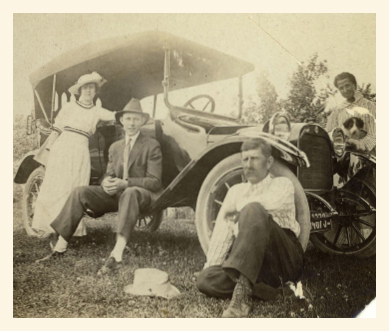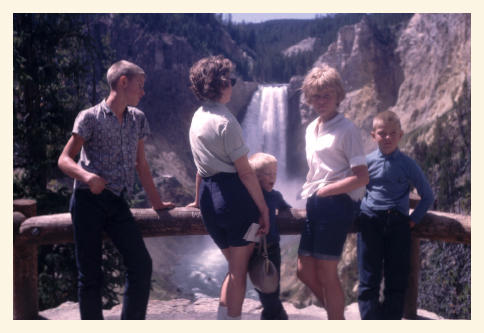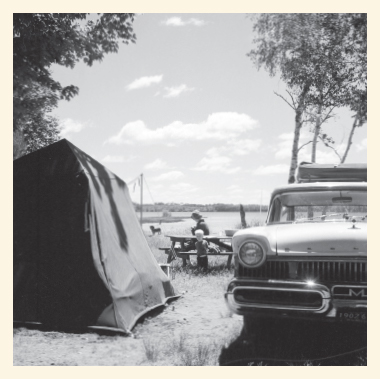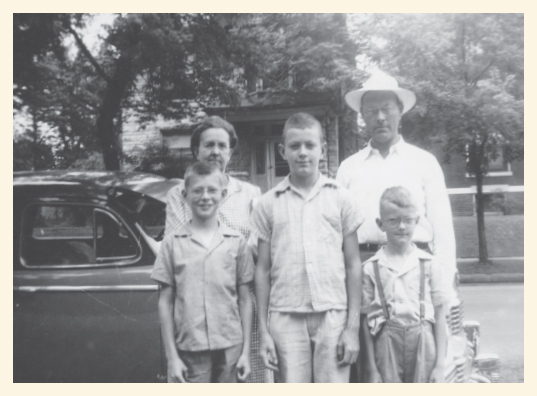By Kurt Rump
Will the future appreciate the past? Good question. It was the subject of a conversation I recently had with a friend, and she was deeply concerned about it.
I’ll come back to that discussion in a bit. First, let me give you some context.
“The future” is a reference to those who stand to inherit whatever you leave behind. That said, it follows that “the past” is a reference to whatever you have accumulated, whether from inheritance or on your own.
At some point… and this is the point that none of us really wants to talk about, but none of us can really avoid… you and I will become “the past.” Not a pleasant thought, but it makes for some juicy conversation.
Now, when you think about what you have accumulated, the tendency is to think about “stuff.” And if that is where your head goes, then it is easy to understand why you might be concerned. A quick Google search about “millennials and stuff” yields results that bear a consistent theme:
- As millennials reject family treasures, baby boomers start to ask, ‘What do we do with all this stuff?’ – By Denise Crosby, The Beacon News (Chicago Tribune – Aurora suburb)
- Your Millennial Doesn’t Want Your Stuff: Why Millennials Are Trending Toward Minimalism – By Dr. Andrea Umbach, Psych Bytes
- Stuff it: Millennials nix their parents’ treasures – By Jura Koncius, The Washington Post
Wow. When you consider how much you value the things that were passed down to you, this can be discouraging. Maybe even depressing.
But hang on a moment. Let’s take a step back. You have accumulated a lot more than just some stuff from the past. You have accumulated knowledge! You know stories about the people who owned the stuff that you value so much. It’s a good bet that a key reason you value many of the things you inherited is that you have memories attached to them.
Stuff without context is just… well… stuff.
Let me share a quick story…
In my home office, in the same room with the desk where I’m writing this, is another piece of furniture. A traditional secretary. It came from my grandparent’s house (Dad’s side). When I look at the secretary, I don’t just see a piece of furniture. I see ‘Nana’ and ‘Butchie Boy,’ as we affectionately called them.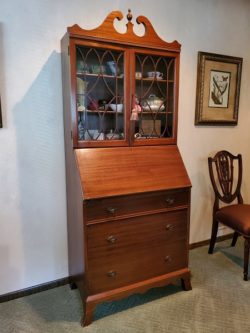
That secretary sat in a room in their home that was initially used as an office. However, it became necessary to transform the office into a makeshift bedroom after Butchie Boy was diagnosed with Buerger’s disease, which led to both legs being amputated at the knee. Despite his circumstances, Butchie Boy was always a good-natured, jovial character around his grandkids. With every visit to their home, my sibs and I would dash to his bedside, where he was always ready with a smile, some kind words, and a sweet treat from his never-ending supply of Tootsie Rolls.
Nana would do the ironing in that room. The secretary bears some scratches in the curved valleys of its decorative top where, in lieu of a closet rod, she would hang some shirts or blouses that needed pressing. The hinged desktop, when closed, bears a vertical crack in the veneer near the left side, likely the result of water damage from a laundry item that was hung too wet and dripped onto the surface.
Will my kids (“the future”) care about that secretary (“the past”)? Maybe, maybe not.
But do they care about Nana and Butchie Boy? Have they enjoyed listening to the stories? Asked questions? Do they care about their family history? Absolutely!
Now back to my friend…
Which brings me back to the conversation I had with my friend.
You see, she told me that among the things that were passed down to her was a collection of old family photos. It is not a well-documented collection, meaning that not a lot had been written on the backs of the photos, and most of the people who would know more about them are no longer alive.
Further, coupled with the challenge of how to tackle that collection, she fears that the next generation won’t care about any of it. She has already seen her millennial children demonstrate a complete lack of interest in things that were valued by her parents and grandparents.
It was at this point in our discussion that her voice started to crack, as she tried to choke back her emotion and fight the tears. She envisioned her children inheriting a trunk full of meaningless photos, her family history destined for an eventual estate sale or, worse yet, a landfill.
Whoa… slow down my friend. Let’s stop, take a breath, and try to put a different perspective on this.
The future’s perspective
First of all, you’re not alone. Your challenges, fears, and frustrations are shared by many. You’re feeling the burden of responsibility that comes with the desire to keep the family flame burning eternally, but you feel like you are walking into a stiff wind that threatens to extinguish it.
That’s OK. Your heart is in the right place. And it is not that hard to keep the flame burning. You just need to know what steps to take.
Secondly, don’t confuse your children’s indifference about the “things” you have with their interest in family history.
I discovered an interesting post by Amy Johnson Crow, a Certified Genealogist®, entitled The Truth About Millennials and Genealogy. In it, she describes how, when it comes to the “things” in your family history (like family heirlooms and keepsakes), millennials “need to have a reason.” Whose was it? What is that person’s story? Why is this vase special to us? It isn’t enough to just pass down a vase and expect someone of that generation to want it (and keep it).
On the other hand, when the topic turns to family history, millennials, like every generation before them, have a natural curiosity. They are eager to learn… to find who they are, where they came from and why.
So, where do you go from here?
It is a common misstep to place a lot of value on the things you inherit. A lot of that stuff is sentimental. It evokes real emotion. If only those things could talk! But they can’t.
Your challenge is to give those things a voice. Take your photo collection and, more than simply sharing the photos, have conversations around them. Make a connection with other family members or friends who can help shed light on the people, places and events captured in those photos. Tell the family stories. Share your memories.
Imagine capturing those stories and memories in a way that preserves them for future generations.
So they’re never lost. And easily shared.

